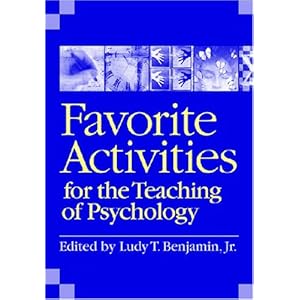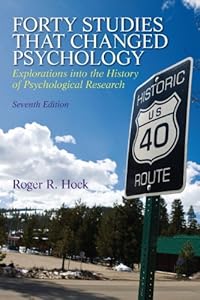Please excuse the cross-posting. We are trying to make sure we reach
everyone interested in the MATOP meeting.
Since 1993, Milwaukee area psychology teachers have gathered twice a year
to share teaching ideas and develop friendships. Our group has come to be called
the "Milwaukee Area Teachers of Psychology" (MATOP). Below you will find an
invitation to our next meeting. If you live within driving distance of the
Milwaukee area, please feel free to attend. If you would like to be included on
the MATOP mailing list please contact me at the email address below.
For those of you not within driving distance of Milwaukee, feel free to
check out our agenda for items you might find useful in your classroom. Whenever
possible, I have tried to include email or website addresses for further
information. Please contact me with any questions you may have.
Kent
Below you will find the November 14, 2013 Milwaukee Area Teachers
of Psychology (MATOP) Meeting Agenda. Please refer any questions to Kent Korek
at kkorek@germantown.k12.wi.us
Dear Psychology Teacher:
Please consider attending the 20th anniversary meeting of the
Milwaukee Area Teachers of Psychology (MATOP) on Thursday,
November 14, 2013 at 7:00 p.m. at Pius XI High School,
135 N. 76th Street, Milwaukee 53213 in the Library.
Our meeting will include:
■ a presentation,
"DSM-5: Not Without Controversy", by Rhinehart
Lintonen, MATOP member emeritus. Rhinehart's talk will emphasize the
past history of DSM, what the controversies have been and remain, and what the
new DSM-5 looks like (changes, deletions in categories, additions, structural
changes in the manual). Our hope it to upload the presentation slides and
handouts to the MATOP website at
http://www.germantownschools.org/faculty/kkorek/MATOP_Home_Page.cfm
for those unable to attend our meeting. Please check back at the site in the
coming weeks.
■ an
inspection of a number of texts and supplementary
books from Prentice Hall/Pearson (
http://pearsonschool.com) . In honor of
MATOP's twentieth anniversary, Pearson has sent examination copies of all the
items listed below for everyone at our meeting. For more information on these
texts please contact Pat Salstrand, Pearson Education K-12 Humanities
Specialist,
(320) 249-9160,
pat.salstrand@pearson.com.
.
Teacher's
Edition of Psychology by Katherine Minter and William
Elmhorst
.
Student Edition of Psychology by Katherine
Minter and William Elmhorst
.
AP Edition Psychology 2e by
Saundra Ciccarelli and J. Noland White
.
AP Test Prep Series: AP
Psychology by William Elmhorst
.
Forty Studies that
Changed Psychology 7e by Roger R. Hock
A very special thanks goes
to everyone at Prentice Hall/Pearson for going above and beyond the call of
duty. Sending five different items will help make our twentieth anniversary
meeting a huge success.
■ an examination of
Barron's AP Psychology Exam Student Study
Guide and Flash Card set by Rob McEntarffer and Allyson Weseley. All
those in attendance will receive a complementary copy of both the review guide
and a set of 500 flash cards. To learn more about Barron's review program, go
to
http://www.barronseduc.com/test-preparation-ap.html
■ a review of two texts from
W.W. Norton (
http://books.wwnorton.com). Everyone at
our meeting will receive a copy of
Psychology 8e by Gleitman, Gross and
Reisberg and
Psychological Science 4e by Gazzaniga, Heatherrton
and Halpern through the generosity of Travis Temple,
(929) 800-1417,
ttemple@wwnorton.com. Welcome to Travis,
the new Norton WI sales representative. Please be aware, Norton recently
started selling texts directly to the high school market. Be sure to check out
their new high school website at
www.wwnorton.com/highschool,
especially The Norton Psychology Reader.
■ the sharing of items from Gerry Palmer
palmtree60045@yahoo.com of
Psychkits (
http://www.psychkits.com). One lucky
person will leave with a pair of
displacement goggles ($15
value) and another, a pair of
inversion goggles ($25
value).
■ an analysis of the "hot off the press",
The Science of
Psychology: An Appreciative View 3e (2014) by Laura
King. This text, so new it has yet to be posted on the Glencoe website
(
https://www.mheonline.com), will be
distributed to everyone in attendance. A special thanks goes to Diane Bellin,
McGraw-Hill Education WI Representative,
(262)
347-7047,
diane.bellin@mheducation.com for
getting us this text so quickly.
■ a presentation from
Colleen McFarland, the Bedford,
Freeman and Worth representative,
(630) 468-2251
cmcfarland@bfwpub.com on upcoming AP
Psychology titles coming from Worth and using eBooks in your psychology course.
For more information on psychology products from Worth, go to
www.worthpublishers.com.
■ a look at the
Latest News in Psychology/AP Psychology
including:
. 2014 AP Psychology Exam date
. changes in the AP
Psychology Course Description
. the AP Psychology International Exam and
its ramifications
. the released 2013 AP Psychology Practice
Exam
. the publication of the DSM-5
. the DSM-5 and AP Psychology
Curriculum and Exam
. AP course redesigns
. change in the AP proctor
eligibility policy
. AP exam fee changes
. the publication by NCSS,
"C3 Framework for Social Studies State Standards"
. the article "High
School Psychology: A Coming of Age" in the October 2013 edition of Teaching of
Psychology.
. the Whitman Journal of Psychology (
www.whitmanpsychjournal.org)
. Prep-U,
an adaptive quizzing environment
. the 2014 AP Annual Conference in
Philadelphia
. articles on Advanced Placement in the October 13th edition
of Social Education by NCSS
. statistics on the 2013 AP Psychology
Exam
. information on Teachers of Psychology in Secondary Schools
(TOPSS)
. information on the NCSS Psychology Community and the NCSS
National Convention
. If you are unable to attend the MATOP meeting and
would like more information on any of the above, please email Kent Korek at
kkorek@germantown.k12.wi.us
■ a sharing from the
College Board One-Day Workshops at
Alverno College and
Grayslake. We would ask
anyone who attended these workshops, to briefly discuss the events of the day.
Please contact Kent (
kkorek@germantown.12.wi.us) is you
are interested in sharing.
■ a report from the
Fox River Valley Teachers of Psychology in
Secondary Schools (FOXTOPSS) meeting. We would ask anyone who attended
this meeting, to briefly discuss the events of the day. Please contact Kent (
kkorek@germantown.12.wi.us) is you
are interested in reporting.
■ activities/demonstrations/resources for classroom use.
At previous meeting, we agreed to spend more time letting teachers share some of
their best classroom activities. Please feel free to bring something to the
meeting. Bring handouts for 35 to 40 people.
■ and much more.
Everyone is welcome to attend. There is no need to RSVP. Please feel
free to invite anyone you feel might be interested in coming. Our meetings
usually last about two hours. You need not stay the entire time.
Ruth Regent-Smith
Kent Korek
If you would prefer not to receive these invitations and be permanently
removed from our mailing list, please send a message to
kkorek@germantown.k12.wi.us






























